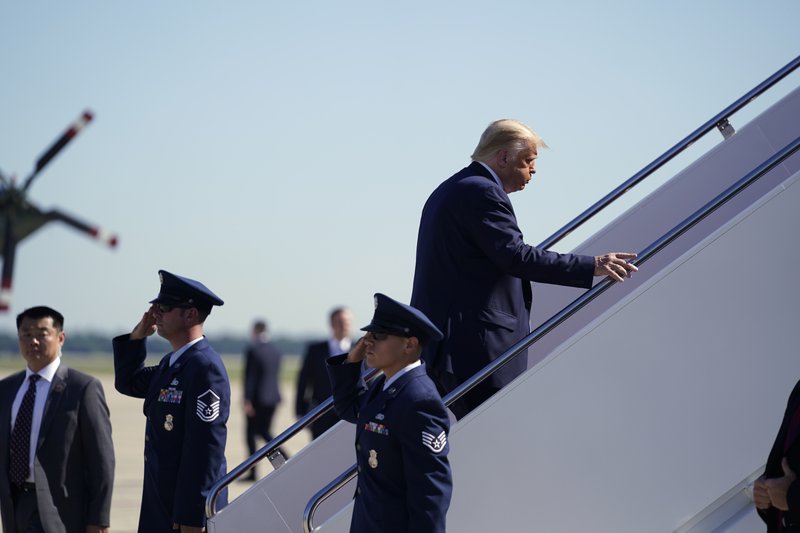President Donald Trump’s visit to a U.S. fracking hub on the West Texas plains comes during the state’s fierce coronavirus outbreak and a global oil and gas glut that is putting the squeeze on his loyal donors in the petroleum industry.
Trump is combining some fundraising Wednesday with his first trip to an oil and gas rig and to his first visit as president to the Permian Basin. He’ll pull in up to $100,000 a person at a roundtable with supporters.
“The amount of money might be slightly off because the markets are down and they’re suffering a bit,” said Bill Miller, a prominent lobbyist and consultant in Austin. “But it’s the kind of industry that remembers their friends through thick and thin, and Trump has been their friend.”
Texas over the past month has experienced a dramatic spike in newly confirmed coronavirus cases, hospitalizations and fatalities. The state became one of the nation’s hot spots as Texas politicians debated masks and other measures.
Even as Air Force One carried Trump to Texas on Wednesday, the U.S. Energy Information Administration reported U.S. petroleum use plummeted to a nearly 40-year low this spring, owing to the pandemic lockdown and to market oversupply due in part to intensive oil and gas production that Trump encouraged. Oil and gas prices and production have picked up somewhat since, but it’s still a tough time in U.S. oilfields.
Trump’s government has exerted itself for the oil and gas industry at least as hard it has for any other sector. That includes rolling back environmental and public health protections while promoting a technology-driven surge in U.S. oil and gas production — begun under President Barack Obama — as part of what Trump describes as an American march to global energy dominance.
His administration has moved to open up vast wilderness areas to oil and gas interests over the objections of environmental groups. Trump also has sought to override various regional objections to oil and gas pipelines with executive orders.
And next month, the administration is expected to announce its latest effort to block regulation of the industry’s emissions of methane, a potent agent of climate change. West Texas environmental activists say the methane emissions are part of a too-little-regulated industry’s assault on the air, water and public health in the region’s yearslong expansion of oil and gas production. Successful legal challenges stopped the administration’s earlier attempts.
When flying at night into the West Texas city of Odessa, among the areas Trump is due to visit, “it looks like a huge birthday cake, there are so many flares out here” from facilities burning off methane as an oil and gas byproduct, said the Rev. Gene Collins, a civil rights and environmental and public health activist in the city.
“There’s already methane emissions like you wouldn’t believe in West Texas,” Collins said. He added that he was one of many in his town using a nebulizer to deal with breathing problems he blames on oil and gas operations. “There’s a definite effect on the health of individuals here.”
Texas-based environmental advocates like Sharon Wilson, who uses thermography imaging to capture methane emissions not visible to the eye, describe environment-damaging oil and gas emissions surging during the fracking boom and now.
The American Petroleum Institute trade group during this presidential election cycle — featuring Democrats calling for the country’s most aggressive action yet to slow climate change — has stepped up efforts to highlight what it says are industry efforts to cut methane.
Frank Macchiarola, the trade group’s senior vice president for policy, said emission rates in the Permian Basin have fallen despite what had been the surge in production. It “demonstrates how the industry is meeting this challenge and strengthening its environmental performance,” Macchiarola said.
Texas oil country has long been a reliable well of fundraising for Republican presidents. But in this campaign, the state itself may be a battleground.
Trump and his Democratic challenger Joe Biden are in a closely fought race in what has been a Republican stronghold. For years, Democrats have been watching Texas demographics — it has growing populations of Latinos, young people and ex-Californians — and pining for the election cycle when it would be in play.
Though Trump won the state comfortably in 2016, former Democratic Rep. Beto O’Rourke gave Republican Sen. Ted Cruz a scare two years ago, and Democrats have used that race to try to build an organization that could swing the state blue. Sensing an opportunity, Biden has begun airing advertisements in Texas as coronavirus cases surge in the state.
When it comes to battleground state claims here, “the proof is in the amount of money the campaigns spend” going forward, said Miller, the Austin lobbyist and consultant.
Losing Texas, Republicans fear, would completely scramble their party’s ability to obtain the needed 270 electoral votes to capture the White House. Though privately Trump campaign officials concede the need to spend time and money in Texas, assets they would prefer to spend elsewhere, they remain confident about their ability to retain the state and have expressed hope that Democrats will waste resources trying to obtain a prize that is out of reach.
But the Trump campaign does now have plans to frequently visit Texas. Trump’s visit Wednesday will allow him to raise needed money — Biden has cut into the president’s fundraising advantage — as well as showcase both his administration’s deregulation agenda and its attempts to get the economy roaring again.
(AP)











